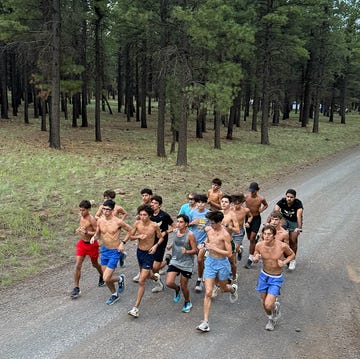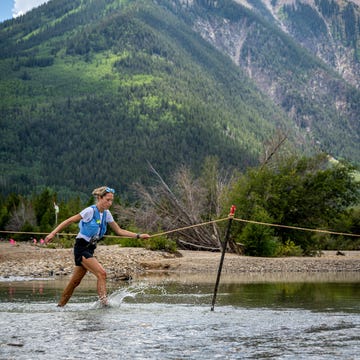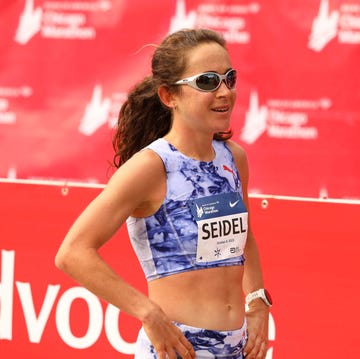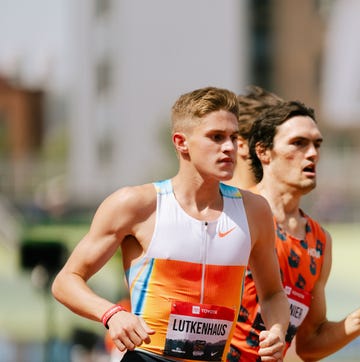Graham Blanks has a sweet bike.
It’s a dark blue vintage Fuji Allegro. Single speed. He bought it from the nonprofit Bikes Not Bombs. It’s built for agility but customized for comfort.
A “Frankenstein bike,” as Blanks calls it.
Blanks, 22, rides it everywhere around the Harvard campus. To class. To practice. Exploring around Boston. It was the inspiration for his senior thesis, which compares bike lane usage and subway ridership in Boston.
Blanks’s time at Harvard has been unconventional, but highly successful.
For a few years, he flew under the radar, but he finished his college career with back-to-back wins at the NCAA Cross-Country Championships, set a then-collegiate record in the 5,000 meters, and represented the United States at the Paris Olympics in the 5,000, gritting his way to the final and placing ninth.
On December 9, Blanks announced he would be forgoing the remainder of his collegiate eligibility and signing a professional contract with New Balance.
His next race will be a 1500 meters at the New Balance Indoor Grand Prix in Boston on February 2. Then he plans to run the 3,000 meters at the U.S. Indoor Championships three weeks later, as a tuneup for The Ten—an outdoor track meet in March where U.S. pros go to chase the world standard (27:00) in the 10,000 meters. Blanks hasn’t run the event since 2023, but his cross-country prowess indicates he’s capable of getting the mark.
As he enters a new chapter, Blanks will try to find his place in professional running. Already, he’s one of America’s most promising distance runners. But first, he gets to enjoy being a college student for one more semester as he finishes classes and graduates in May.
Then, this Olympian who loves reading philosophy, studying topographical maps, and watching urbanism videos on YouTube, will have to figure out how to not get bored of the idle time that often accompanies being a pro.
A fast learner
In a way, Blanks has already lived like a professional.
After graduating from Athens Academy in Athens, Georgia, as one of the top recruits in the state, Blanks—along with most of the Harvard men’s team—decided to take a gap year. It was 2020, and the Ivy League canceled all sports for the remainder of the year due to the COVID-19 pandemic. So Blanks and his teammates set up camp in Flagstaff, Arizona, where they hunkered down to train with few distractions.
Blanks was a “quick responder” to Flagstaff’s 7,000 feet of altitude, his coach, Alex Gibby, says. And it showed in Blanks’s performances. In the spring of 2021, he went on a tear, running 13:47.72 in his first track 5,000 meters, then dropping his time to 13:27.39 at a professional meet in Massachusetts.
Blanks was improving at a breakneck pace, which in part, he credits to his breezy attitude. He looked up to the older guys on the team and wasn’t afraid to be a college kid.
He went surfing with his teammate, Acer Iverson, the morning of a spring race in California during the gap year. (Or maybe it was the day before, he can’t remember.) The two friends had never surfed before, but they didn’t think twice about the 5,000 that was looming.
“I’m not super picky about conserving energy or anything,” Blanks says. “My main focus is like, ‘Am I relaxed? Am I having fun?’ If I’m in a good mental space going to the race, it’ll almost always be a good one.”
When Blanks got to campus in 2021, he made an instant impact for the Crimson, particularly on the grass. He was 23rd at the NCAA Cross-Country Championships, earning All-American honors. The next year, he was even better, placing sixth.
Then, in his junior year, Blanks went undefeated to win his first national championship, dropping the lead pack with a kick from half a mile out.
Two weeks later at a meet at Boston University’s notoriously fast indoor track, Blanks broke the 5,000-meter collegiate record, running 13:03.78. Perhaps more importantly, Blanks had run 1.22 seconds faster than the Olympic standard of 13:05.00—an important benchmark if he wanted to make the Olympics in the summer.
A blessing and a curse
If Graham Blanks has a weakness, it’s the third or fourth week of January.
Since joining the Harvard team, Blanks has struggled with staying healthy after the winter holidays. His first year, he had issues with his Achilles. The next year, it was his adductor.
Last year was no exception. After emerging as the top runner in the NCAA, he developed a stress reaction in the femoral shaft of his left leg, ending his indoor season prematurely. Blanks has a discrepancy in that leg—his left leg is slightly longer than the right—which Gibby thinks gets aggravated by running on a banked indoor track. The tight turns means that there’s much force pounding into his inner leg.
Blanks wouldn’t race again until late April. But he was busy.
Throughout his time at Harvard, Blanks has leaned into the rigorous academics. As a freshman, Blanks was set on studying economics—one of the easier majors at Harvard, he admits—but he added a philosophy major after taking a class on existentialism. Blanks is an avid reader—he’ll cite Camus or The Brothers Karamazov in interviews—and, of course, the class provided some perspective in life.
In addition to Gibby, Blanks is mentored by his academic advisor, Paul Gompers, a professor at the Harvard Business School. Blanks has worked with Gompers as a research assistant, and the professor has pushed Blanks academically.
During Blanks’s injury, the two laid the groundwork for his thesis. Gompers notes that a thesis is optional for undergraduates; Blanks took on the extra work so he could graduate with honors. He was inspired to research bike transit and subway usage after cycling to see his favorite band, Pavement, on a frigid night instead of taking the Boston’s subway. (The “T” was warmer, but biking was quicker.)
Gompers was an accomplished runner himself. His running exploits are folklore on the Harvard team.
The summer after his freshman year of high school, Gompers started ticking off 100-mile weeks. As a freshman on the Harvard team in 1983, he ran 2:15:28 at the Rocket City Marathon in Huntsville, Alabama, setting a world junior record. As he caught up to the lead runner, Bryan Pownall, at the 23-mile mark, Gompers extended a handshake, reportedly saying, “Hi, my name’s Paul. No hard feelings.”
Gompers would go on to finish fourth in the marathon at the 1988 Olympics Trials, testing sports drinks on rats while a Marshall scholar at Oxford University. He ran mind-boggling mileage, maxing out at 175 miles in a week, usually hovering around 140. Thirty-five-mile long runs were normal.
“Gompers can’t tolerate boredom; he despises inertia,” Amby Burfoot wrote in a 1988 profile of Gompers in Runner’s World.
Blanks, too, can’t sit still.
Gompers knows this. The template for a professional runner in 2025 is to run once or twice a day, then spend the rest conserving energy with naps or Netflix. But Blanks needs stimulation.
“I actually think that if that’s what Graham did, he would not run as well,” Gompers says.
During his injury last winter, Blanks stayed busy with classes. Gompers knows that an athletic career doesn’t last forever, so he’s encouraged Blanks to keep his mind stimulated and work on projects that don’t relate to running. Blanks doesn’t mind.
“I don’t think academics are like a substitute for athletics,” Blanks says. “They’re almost like a complement to a certain extent.”
Once he healed from his femur injury, Blanks had some catching up to do. He ran well during outdoor track but was a slight step behind his competitors, taking fifth at the NCAA Outdoor Championships on June 7 in the 5,000. But three weeks later at the U.S. Olympic Trials, on a hot evening, Blanks surprised many by placing fourth in the 5,000 meters. While his collegiate peers were running on tired legs after a long season, Blanks was only then rounding into form.
Normally, Blanks would’ve gone home as the Olympic alternate. But the third-placer, North Carolina’s Parker Wolfe, didn’t have the Olympic standard. Blanks did, thanks to his record-setting run from December. Blanks would have to wait to see if Wolfe’s performance was enough to qualify him via world ranking.
Mary Catherine Smith, the mother of Graham, was in shock on the concourse of Hayward Field after watching her son outlast most of America’s best professionals.
“I was just praying for top 10, knowing that he could get top three,” she said to Runner’s World moments after the race. “I have a feeling we’re going.”
The world’s stage
Mom was right.
After the dust settled and Wolfe’s time wasn’t enough to qualify on world ranking, Blanks was named to the Olympic team, along with Grant Fisher and Abdihamid Nur.
Soon, Blanks and Gibby settled in to altitude camp in St. Moritz, Switzerland, an opulent ski town and training choice for many of Team USA’s distance runners before Paris.
Blanks kept busy. Between runs, he was tackling problem sets and derivatives to prepare for a multivariable calculus class. On the train into Paris for his preliminary round, he submitted his application to be one of Harvard’s nominees for a Rhodes Scholarship. He didn’t make it past the first round, but the work kept him semi-distracted.
“I’m glad I [applied], because it really did keep my mind occupied,” he says. “I was never really nervous during the Olympics at all. Like it didn’t really feel any different than an NCAA race, which I've kind of, at this point, conquered my anxiety over that as well.”
His confidence showed at the Games. Blanks navigated a testy preliminary heat, which saw four athletes fall on the final lap, and qualified for the 22-person final.
At the final, as the camera panned down the starting line, Blanks patiently waited to be introduced. Then, in front of 70,000+ spectators at the Stade de France, he deftly pulled off a detachable thumb trick—then cracked a smile.
His unbothered attitude worked. Blanks hung with the lead pack until 500 meters left, finishing in ninth in 13:18.67.
“It definitely felt like I was playing with house money because I didn’t have as many expectations as, probably, like, Grant or Abdi,” Blanks said in December. “But if anything, that was an advantage for me because I didn’t have those external pressures.”
Looking ahead
Despite reaching the pinnacle of the sport, Blanks decided to return to Harvard for one more semester before turning pro. He wanted to spend another fall with his teammates.
“For me, coming back for cross was never a question, just because that’s what I signed up for,” he says. “Whenever I decided to commit here, I really wanted to be part of a cross-country team, and I really wanted to compete with the team, and that’s been my favorite part of Harvard.”
Blanks sailed through the regular season, despite coming back to training not long after the Olympics, and won his second consecutive national championship on the grass, calmly breaking the field with under a mile to go. Two weeks later, he ran 12:59.89 at Boston University to knock out the World Championship standard.
The World Championships this year are in Tokyo, and Blanks has his eyes on making the U.S. team in the 5,000 or 10,000 meters. Or both. He’ll attempt to run the world standard in the 10,000 at The Ten on March 29.
But before then, Gibby wants to use the indoor season as a chance for Blanks to tune up for outdoors, while keeping him off the banked track during training whenever possible, so as to not aggravate his leg discrepancy.
Once he finishes his classes and graduates in May, Blanks will likely head to Europe to race some outdoor meets, then return stateside for a summer altitude camp. Park City, Utah—where two-time Olympic medalist Grant Fisher trains—is the frontrunner. Gibby, who will continue to coach Blanks, has been visiting the ski town for 40 years.
But until then, not much is changing. Blanks will finish classes and revise his thesis, then graduate in May. There’s still plenty of time to goof off with his friends, jaunt around campus on his bike, and enjoy being a college student.
For now, Blanks is relishing the extra free time. But Gompers—as every good economist does—is already thinking ahead. He anticipates Blanks will need some intellectual stimulation between workouts and physio treatments as a pro. Maybe it’s a part-time masters program. Gompers knows the daily life of a pro distance runner can be quite boring.
But Graham Blanks is not boring.
“His energy has never changed,” Gibby says, reflecting on Blanks’s record-breaking Harvard career. “It’s kind of quirky, intense.”
Theo Kahler is the news editor at Runner’s World. He’s a former all-conference collegiate runner at Winthrop University, and he received his master’s degree in liberal arts studies from Wake Forest University, where he was a member of one of the top distance-running teams in the NCAA. Kahler has reported on the ground at major events such as the Paris Olympics, U.S. Olympic Trials, New York City Marathon, and Boston Marathon. He’s run 14:20 in the 5K, 1:05:36 in the half marathon, and enjoys spotting tracks from the sky on airplanes. (Look for colorful ovals around football fields.)

















